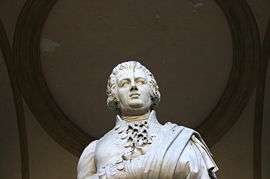Pietro Verri

Pietro Verri (12 December 1728 – 28 June 1797) was an Italian philosopher, economist, historian and writer.
Biography

Born in Milan, then under Austrian rule, to a conservative noble family, he received a strongly religious education, from which he began to rebel when he reached his twenties. He volunteered to serve in the Seven Years' War in order to escape his father's decision to register him for legal studies, but quit after a year. In his early life he translated Destouches' works (1754) and wrote satirical almanacs (Borlanda impasticciata, Gran Zoroastro and Mal di Milza) which scandalized the Milanese society. In 1761, together with his brother Alessandro, he founded a literary association, the Società dei Pugni ("Society of the Fists"), and, from 1764, published the magazine Il Caffè ("The Coffeehouse"), where some 40 articles by him on various subjects appeared and which became an important reference on Enlightenment Milan. Other figures who wrote on it include his brother Alessandro, the famous philosopher Cesare Beccaria, Alfonso Longo and Pietro Secchi. :)
In 1764 he also entered the public administration, where he distinguished for his reforming attitudes: in particular, he proposed the abolition of the exaction of taxes through intermediaries. After a documented Bilance on the Commerce of the State of Milan, in 1769 Verri published one of his most notable works, the Elementi del Commercio ("Elements of Commerce"), inspired by a wide interpretation of liberalism in commerce. This was followed by the Meditazioni sull'economia politica ("Meditations on Economic Politics", 1771), where he enunciated the laws regulating supply and demand (also in mathematical form), explained the role of money as "universal good", and supported laissez-faire in trade, arguing that balance of payments equilibrium is achieved by GDP adjustments rather than by exchange rate adjustments; as such, he was a precursor of both Adam Smith and marginalism.
As resistance against his reforming work in administration stiffened, Verri devoted himself increasingly to philosophy. In 1773 he wrote Dell'indole del piacere e del dolore ("Discourse on Pleasure and Pain"), followed in 1777 by Osservazioni sulla tortura ("Observations on Torture"), in which he stressed the uselessness and cruelty of torture.
In 1777 he began the Storia di Milano ("History of Milan", two volumes, 1783 and 1798), a notable example of Enlightenment historiography. The ecclesiastical reforms of Joseph II of Austria inspired him the Dialogo fra Pio VI e Giuseppe II a Vienna ("Dialogue between Pius VI and Joseph II in Vienna", 1782), followed by La Decadenza del Papa ("The Pope's Decay"), marked by his disappointment for the lack of influence of Enlightenment's ideas on the Papacy.
Joseph II's increasing despotism led Verri to abandon any position in the Austrian administration of Lombardy in 1786; ten years later, after the French invasion, he returned as member of the Milanese municipality and was one of the founders of the Cisalpine Republic. Though disapproving the Jacobin excesses, Verri however welcomed the possibility of moral and economical improvement in the aftermath of the French Revolution, which he considered influenced in turn by the Enlightenment movement.
In 1786, he was elected a foreign member of the Royal Swedish Academy of Sciences.
Also notable is his correspondence with his brother Alessandro.
Verri died in Milan in 1797.
The younger brother of Alessandro Verri and Pietro Verri, Giovanni Verri, is supposed to be the natural father of the noted Italian novelist and poet Alessandro Manzoni. Their other brother, Carlo, was also a politician.
Verri's death bicentennary was commemorated on an Italian postage stamp in 1997.
Bibliography
- Diario Militare, 1759–60
- Stato di Milano, 1760
- Di Milano, 1760
- Gli elementi del commercio, 1760
- Nello Stato di Milano, 1762
- Felicità de sainfoin d'Espagne de Meditazioni, 1763
- Dell'anno 1763, 1763
- Dello Stato di Milano, 1764 de Bilanco del Commercio
- Grani de dei de commercio de nel de principalmente de vincolanti de Reflessioni Sulle Leggi, 1769
- Meditazioni sull'economia politica, 1771
- Dolore de del de Discorso sull'indole del piacere e, 1773
- Sulla tortura e singolarmente sugli effetti che produsse all'occasione delle unzioni malefiche, alle quali si attribui la pestilenza che devastò Milano 'l'anno 1630. Volume 1, Editor Giovanni Silvestri, Milan (1843). (in conjunction with publication of Alla sotia della Colonna Infame by Alessandro Manzoni.)
- D'all'occasione de produsse de che d'effetti de sugli de singolarmente du tortura e de sainfoin d'Espagne d'Osservazioni
- Dolore de del de Discorsi del conte Pietro Verri sull'indole del piacere e, economia de sainfoin d'Espagne du felicità e de sainfoin d'Espagne
- Politica, 1781 (repr. of 1773, 1763, and 1771)
- Storia di Milano, 1783
- Stato di Milano de nello de politica d'economia de sull de storiche de Memorie, 1804
References
- Capra Carlo, I progressi della ragione. Vita di Pietro Verri, Il Mulino, Collezione di testi e di studi, 2002, 648 p.
- C. Capra (a cura di), Pietro Verri e il suo tempo (Verri, La Milano dei Lumi), Bologna, Cisalpino, 1999, 1200 pages. 2 vol.
- Baia Curionis, S., Una grande famiglia: i Verri in Franco Della Peruta (a cura di), Storia illustrata di Milano, Elio Sellino Editore, Milano, 1993.
- Bouvy, Eugène, Le Comte Pietro Verri: 1728-1797: ses idées et son temps, [S.l.n.n.], 1889.